
When it comes to making dinner, you might switch up your grain routine by subbing in brown rice or quinoa for standard white rice. These alternatives boast more fiber and protein than their white counterpart. But if you’re looking for a grain that really packs a lot of nutrients, you should look a little closer to home: Wild rice is one of the only grains native to North America.
Wild rice is packed with nutrients like fiber and protein and is heart-healthy. Beyond these health benefits, wild rice is delicious and adds great texture and color to recipes. The best part: It’s not hard to make. Learning how to cook wild rice is a breeze (if you can boil water, you can make this rice). We’ll show you how!
What Is Wild Rice?

Want to know something surprising? Wild rice isn’t technically rice at all. It’s actually a seed from North American aquatic grasses commonly found in the Great Lakes region. Technicalities aside, wild rice does have a similar shape to white or brown rice and it’s cooked using the same technique.
Wild rice does differ drastically in flavor and appearance compared to other types of rice. The grains are longer and darker. The exterior color of the rice varies depending on where the rice is harvested from, but it’s typically dark brown to almost black. The flavor of wild rice is also distinct; wild rice is almost nutty and retains a slightly chewy texture once cooked.
Outside of the differences in taste, wild rice boasts some unique health benefits. This kind of rice has lots of fiber, protein and antioxidants—much more than traditional white rice.
True Wild Rice vs. Cultivated Wild Rice
When you shop for wild rice, it’s important to know that there are two varieties, the first being real wild rice. This wild rice is harvested from lakes, rivers and creeks where it grows truly wild.
Most grocery stores stock a domesticated version of this rice which is called paddy or cultivated wild rice. This varietal was adapted by the University of Minnesota to grow in paddies where it can be harvested by farmers. It’s not quite the real deal in terms of being “wild” but it’s still tasty and healthy.
How to Make Wild Rice

Making wild rice is very simple. If you can make brown rice or white rice on the stovetop at home, wild rice won’t be any trouble at all.
Ingredients and Tools
- 1 cup wild rice
- 3 cups water
- Dash of salt
- Wild rice: True wild rice harvested from the Great Lakes region is a treat. Native Harvest wild rice is harvested by members of the Ojibwe Nation in northern Minnesota. Wild rice, called manoomin in their native language, is important to the tribe. It’s something they take very seriously—and when you buy from them, you know you’re getting the good stuff.
- Saucepan: This is essential for making any type of rice. A nonstick version helps with cleanup.
- Sieve: A mesh strainer is essential for rinsing your rice. You’ll find lots of other uses for this tool in the kitchen too, like sifting flour, straining pasta and more.
Directions
Step 1: Rinse the Rice
Just like with any other type of rice, it’s a good idea to rinse the rice before cooking. Pour a cup of wild rice into a mesh sieve and give it a good rinse. This will rid the rice of any starch that’s lingering on the outside of the grain. This extra starch can make your rice—be it wild or any other kind—gummy once it cooks.
Step 2: Bring to a Boil
After rinsing, add your rice to a saucepan with three cups of water and a dash of salt. With the pot uncovered, bring this to a boil. Once boiling, cover and reduce the heat.
Step 3: Simmer
Bring your water down to a simmer and let the rice cook until tender (though it should retain a little crunch). This should take about 30 minutes. If you find it’s still very crunchy, let it simmer a bit longer—up to an additional 15 minutes.
If there’s any remaining water, strain it away. Then fluff the rice with a fork and serve. The finished rice should be chewy and some of the grains should pop open revealing the tender inside.
Editor’s tip: Keep an eye on your rice after the 30-minute mark. You don’t want to overcook the rice. You can tell the rice is overcooked if the seed coating splits and the grains roll up into curlie-cues. It won’t harm you to eat overcooked rice, but it does lose some texture and doesn’t look as appealing.
What Goes with Wild Rice and How to Cook with It

Wild rice just might be the grain you’re not using often enough in your cooking. With its nutty flavor and hearty texture, it can add personality—not to mention protein, fiber and antioxidants—to plenty of dishes.
- Soups: Instead of adding rice or noodles to your next batch of soup, consider adding wild rice instead. Not only does it taste delicious, but it also soaks up the broth much more slowly so the rice won’t be soggy. Start with this top-rated chicken and wild rice soup.
- Salads: Adding grains to salads is nothing new. Next time you’re prepping a salad, sub in wild rice for the quinoa or barley the recipe may call for. It adds flavor and texture like in this peach and arugula salad and lentil salad.
- Side dishes: Rice sides are a staple at the dinner table. Add a little wild rice to your pilafs for color and texture. You can also add wild rice to your stuffing.
- Mains: Don’t forget that rice can play a part in your entrees too. Learn how to cook wild rice so you can add it to casseroles or even use it as a stuffing like in this stunning pork loin.
- Baking: You can even use wild rice in baking! Like adding oats or seeds, wild rice can add texture and protein to bakes like this seeded bread.
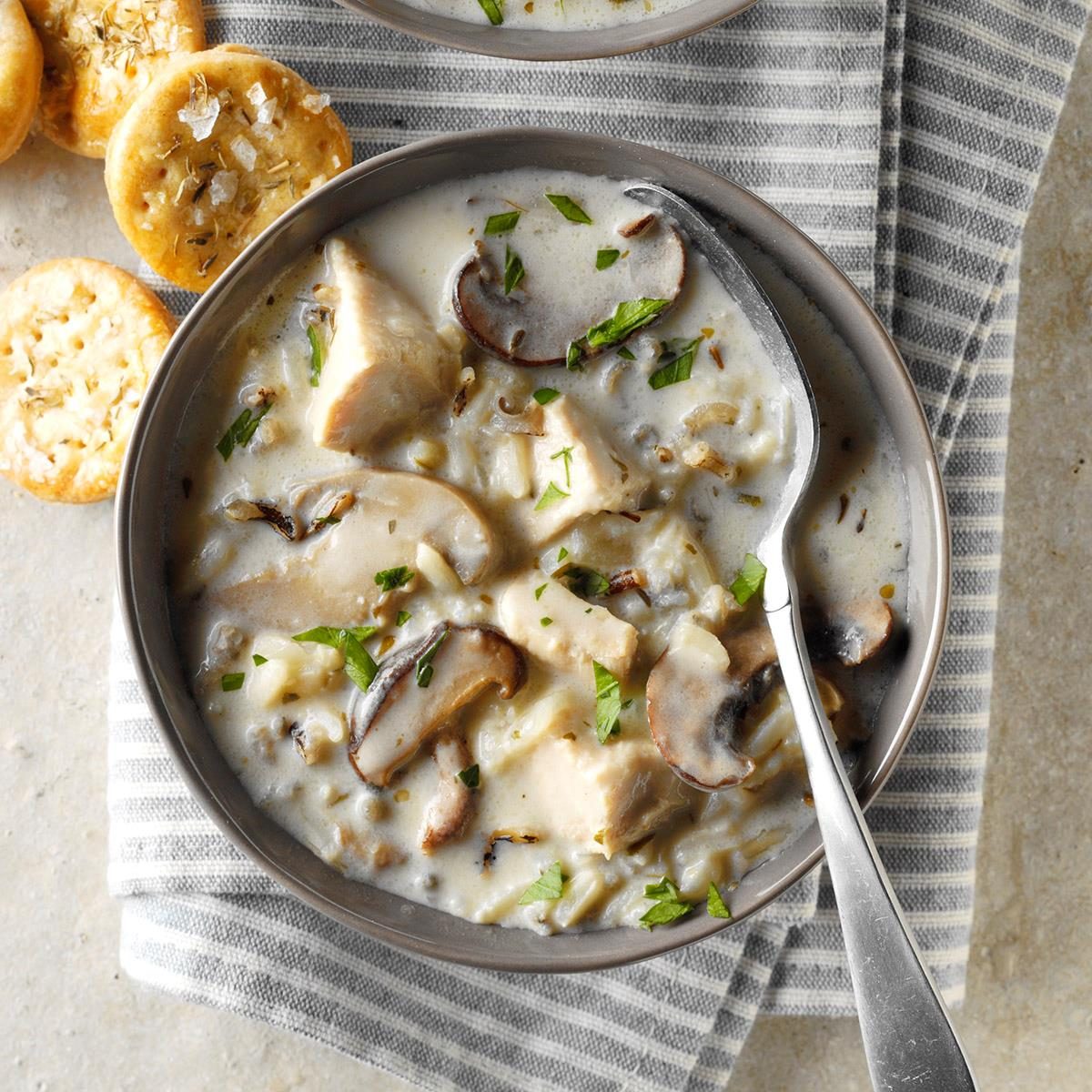
Cream of Turkey and Wild Rice Soup
A dear friend brought me some of this soup when I was ill—and it instantly hit the spot. I asked her for the recipe and I've made it several times since, especially when I have leftover turkey to use up. Now I like to take it to friends when they're not feeling well. It's just the filling meal to warm you up on a cold, wintry day! —Doris Cox, New Freedom, Pennsylvania
Wild Rice Stuffed Squash
I made this recipe when we invited both our families to celebrate our first Thanksgiving in our new home. There were 37 of us, and those who tried this dish raved about it. —Robin Thompson, Roseville, California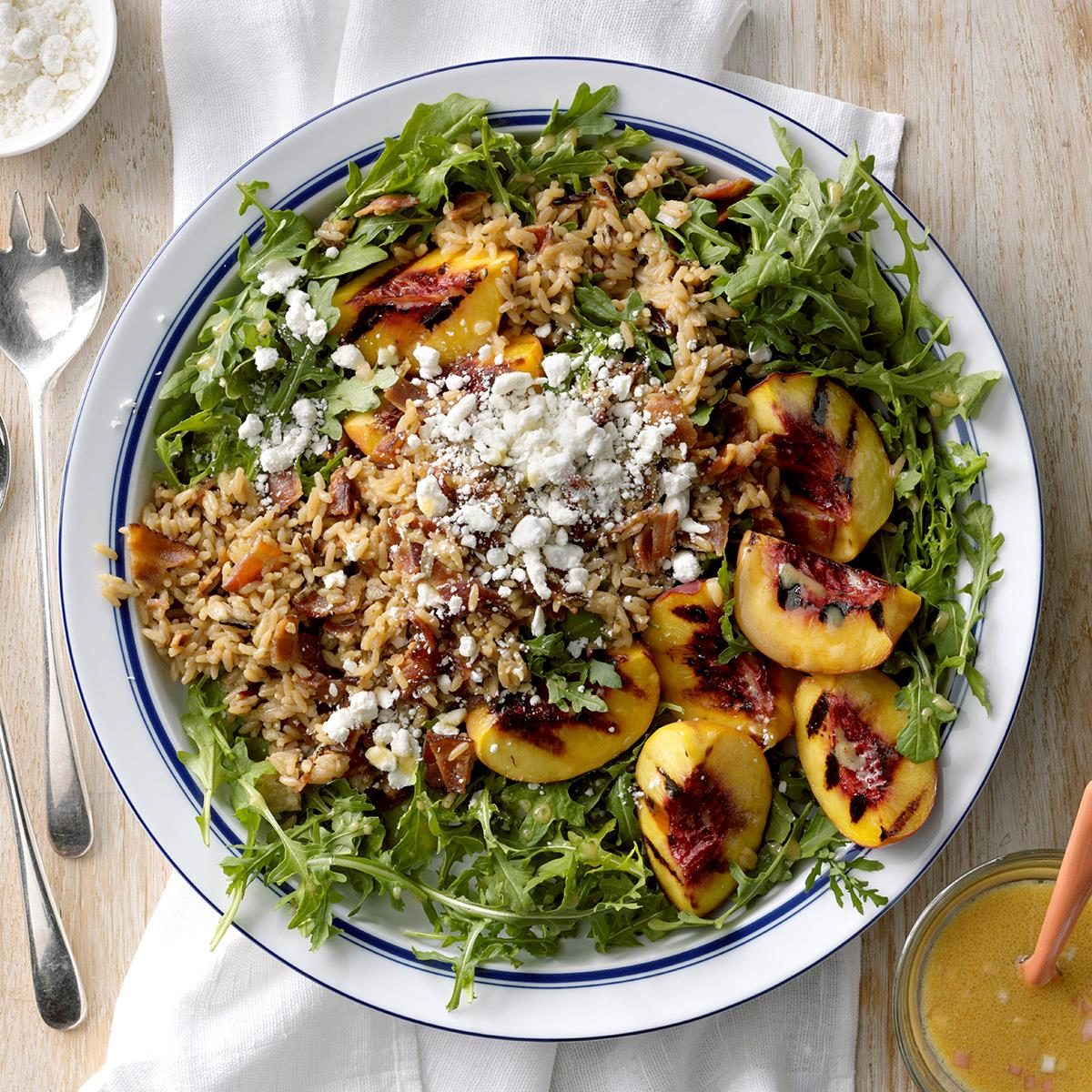
Grilled Peach, Rice & Arugula Salad
This hearty salad was created when I needed to clear out some leftovers from the fridge—and it became an instant hit! The grilled peaches are the ultimate "tastes like summer" salad booster. —Lauren Wyler, Dripping Springs, Texas
Cornish Hens with Wild Rice and Celery
Stuffed with a succulent combination of wild rice, mushrooms and dried cranberries, these golden hens are sure to become a special-occasion entree in your home. They're a wonderful change of pace from traditional turkey. —Nancy Horsburgh, Everett, Ontario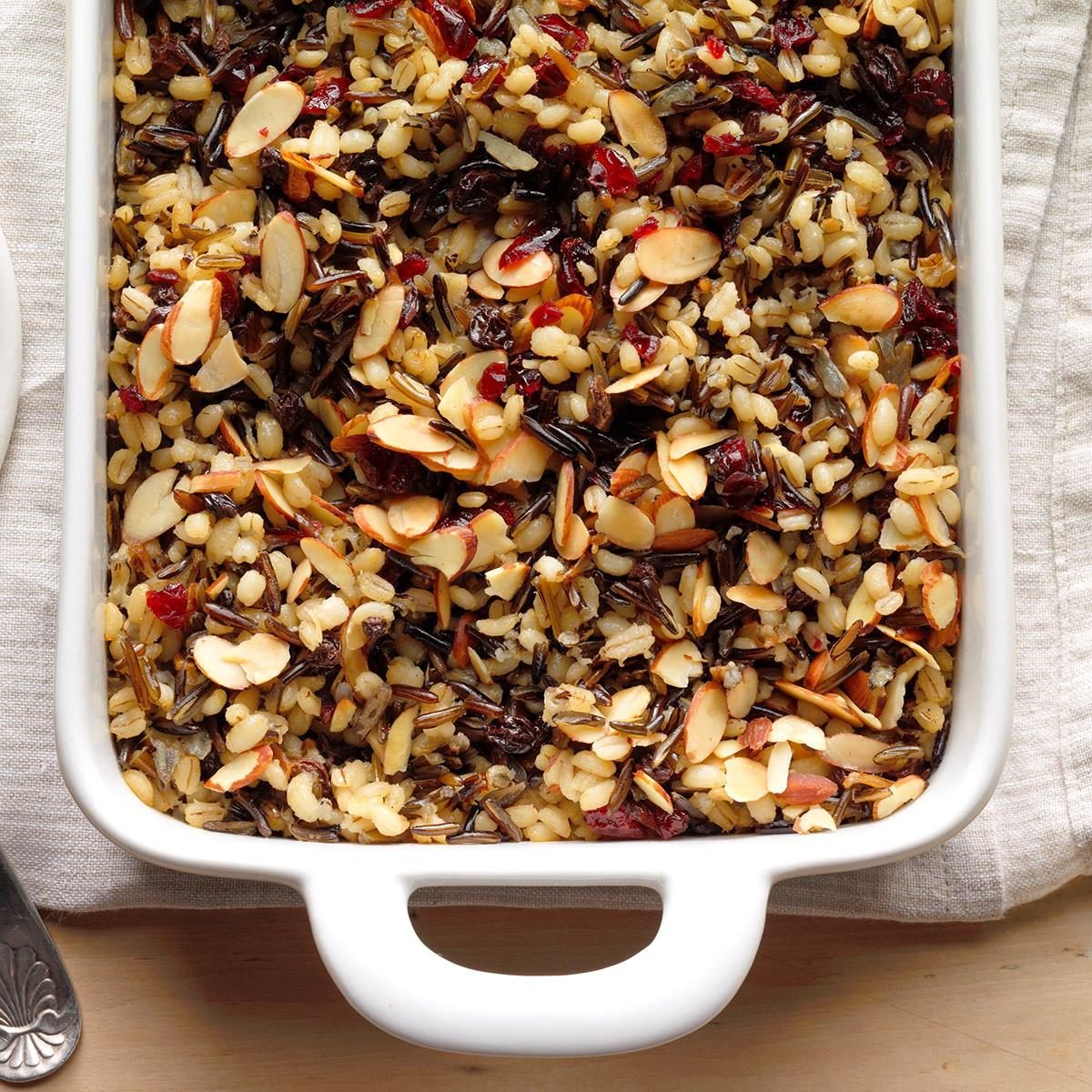
Cranberry Wild Rice Pilaf
This tender side dish is perfect for the holidays or any time you want to add a special touch. Dried cranberries, currants and almonds serve up color and texture. My co-workers all make this rice pilaf for their families. —Pat Gardetta, Osage Beach, Missouri
Spicy Rice Casserole
Stirring up pork sausage, wild rice and jalapeno to taste makes this a terrific side. Or serve it with cornbread to turn it into a main dish. It’s easy to make ahead and reheat for a potluck meal. —Debbie Jones, California, Maryland
Turkey and Wild Rice Soup
My dear friend Shirley shared this recipe with me several years ago. Every time I think of her, I make the soup. I sometimes add a cup of cheddar cheese at the end and melt it in for an extra measure of comfort. —Carol Brault, Woodville, Wisconsin
Wild Rice and Squash Pilaf
This pilaf is fantastic with fish or poultry and especially compatible with turkey. Since it's so colorful, I like to think it makes my turkey dressed for the holidays. —Erica Ollmann, San Diego, California
Greek Brown and Wild Rice Bowls
This fresh rice dish tastes like the Mediterranean in a bowl! It's short on ingredients, but packs in so much flavor. For a hand-held version, leave out the rice and tuck the rest of the ingredients in a pita pocket. —Darla Andrews, Schertz, Texas
Chicken & Wild Rice Strudels
I wanted the buttery crunch of layered pastry without the sweet filling of strudel. Using rotisserie chicken from the store, I found my savory answer. —Johnna Johnson, Scottsdale, Arizona
Chicken Wild Rice Soup
I'm originally from Minnesota, where wild rice grows in abundance and is very popular in recipes. This creamy chicken and wild rice soup has been part of our Christmas Eve menu for years. To save time, I cook the chicken and wild rice and cut up the vegetables the day before. —Virginia Montmarquet, Riverside, California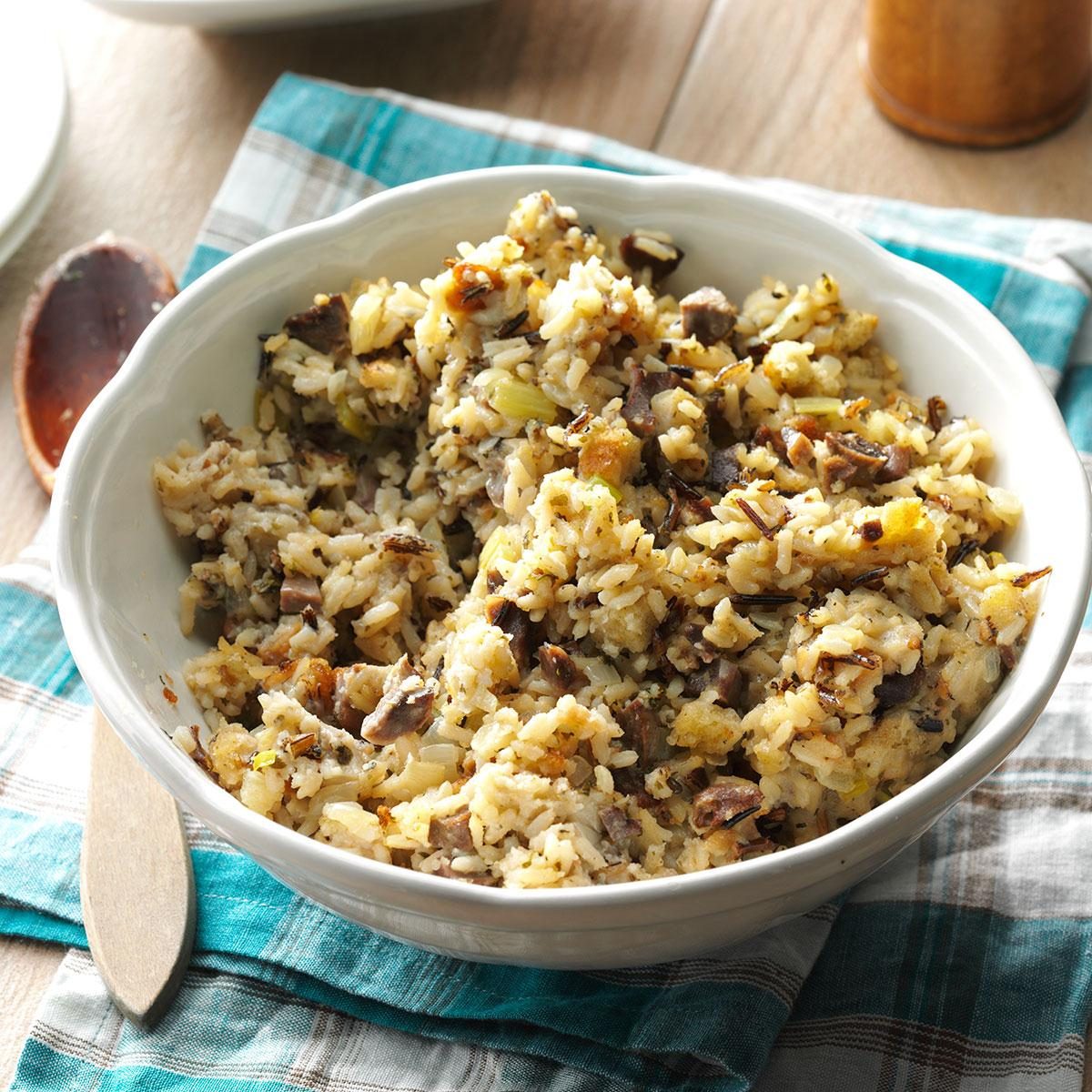
Wild Rice Stuffing
Since trying this stuffing recipe from my sister, I haven't made any other kind. It's so moist and tasty. When a big bowlful starts circulating around the table, happy holiday smiles get even bigger! —Connie Olson, Green River, Wyoming
Chicken and Wild Rice Bake
This recipe is a great example of Midwest food! Its ingredients, including the wild rice, can all be found in Minnesota. The dish is good for larger groups since the cook doesn't need to spend a lot of time in the kitchen. —Suzanne Greenslit, Merrifield, Minnesota
Seafood Casserole
A family favorite, this rice casserole is stuffed with plenty of crab and shrimp to make a special dish that's also hearty, homey and so easy to make! —Nancy Billups, Princeton, Iowa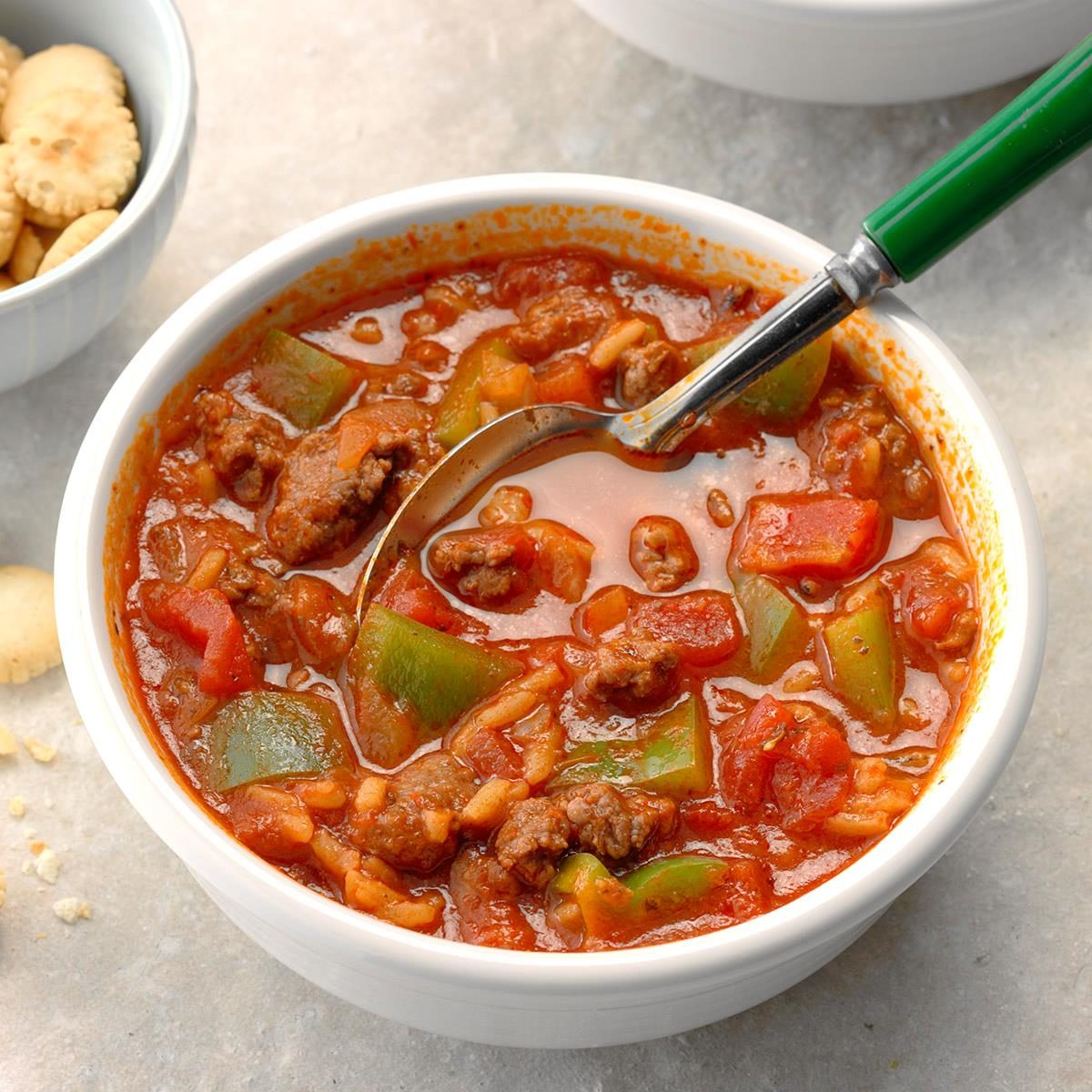
Contest-Winning Stuffed Pepper Soup
This is an excellent example of how convenience foods can be combined for a tasty entree. Ready in minutes when I get home from work, this soup becomes part of a balanced meal with a tossed salad, rolls or fruit. For a variation, try chicken, turkey or even venison instead of ground beef. –Tracy Thompson, Cranesville, Pennsylvania
Cashew Rice Pilaf
This hearty dish will add pizzazz to your plate with its beautiful blend of flavors and colors. I often serve it as a main course with salad and bread. —Tina Coburn, Tucson, Arizona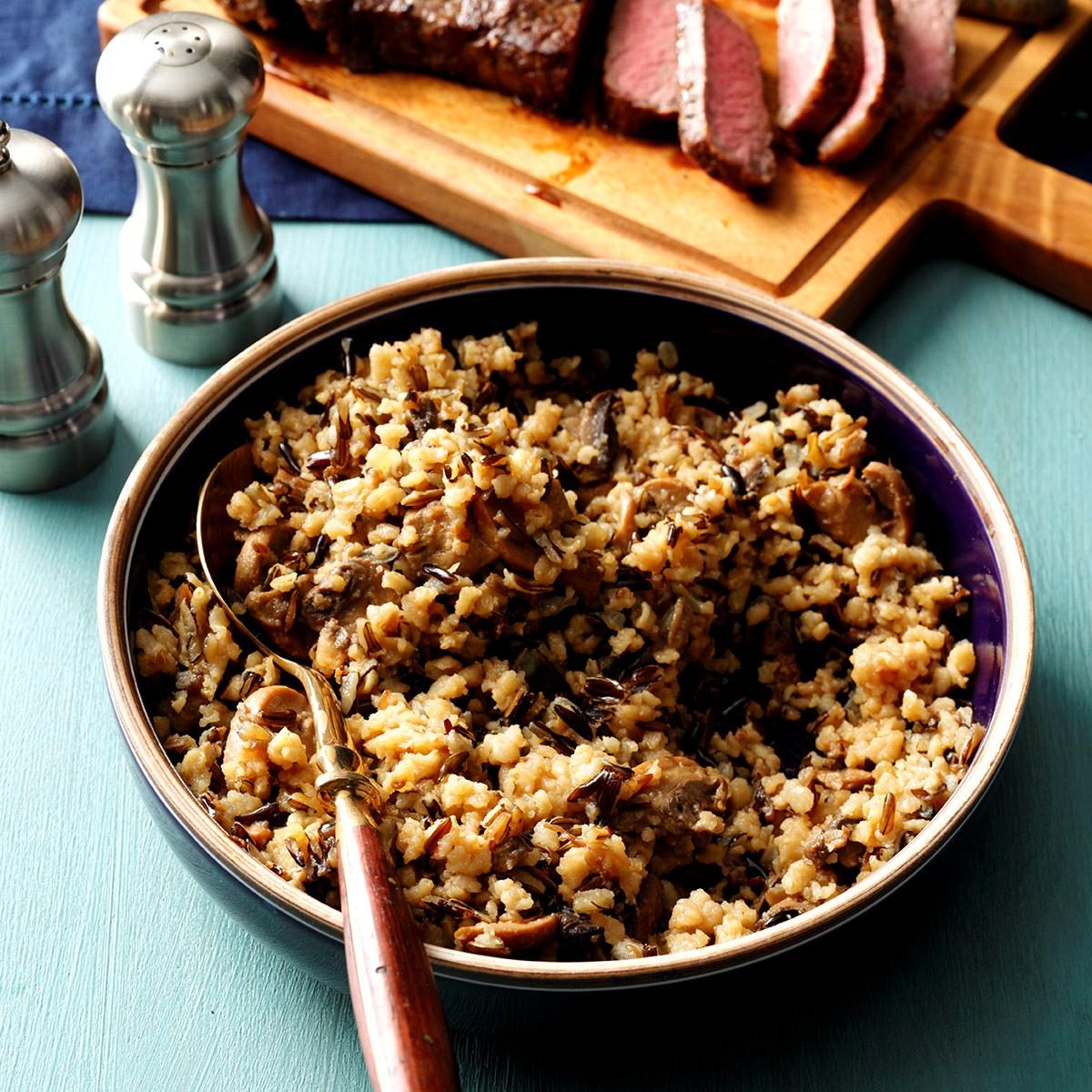
Mushroom Wild Rice
This is one of my favorite recipes from my mother. With only seven ingredients, it's quick to assemble in the morning before I leave for work. By the time I get home, mouthwatering aromas have filled the house. —Bob Malchow, Monon, Indiana
Wild Rice-Stuffed Pork Loin
This recipe features wild rice and apricot stuffing tucked inside a tender pork roast. —Kim Rubner, Worthington, Iowa
Company Rice
This colorful side dish has proven itself the best rice recipe with family and friends. One of my late son’s friends always requested ‘that rice’ when he came over for dinner. It’s delicious served with grilled salmon, beef, turkey, lamb roast or ham. — Jayne Shiley, Campbellsport, Wisconsin
Great Grain Salad
I can't think of a better dish to round out a meal. My grain salad features all my favorite nuts, seeds and fruits. Try adding grilled chicken to make it a meal on its own. —Rachel Dueker, Gervais, Oregon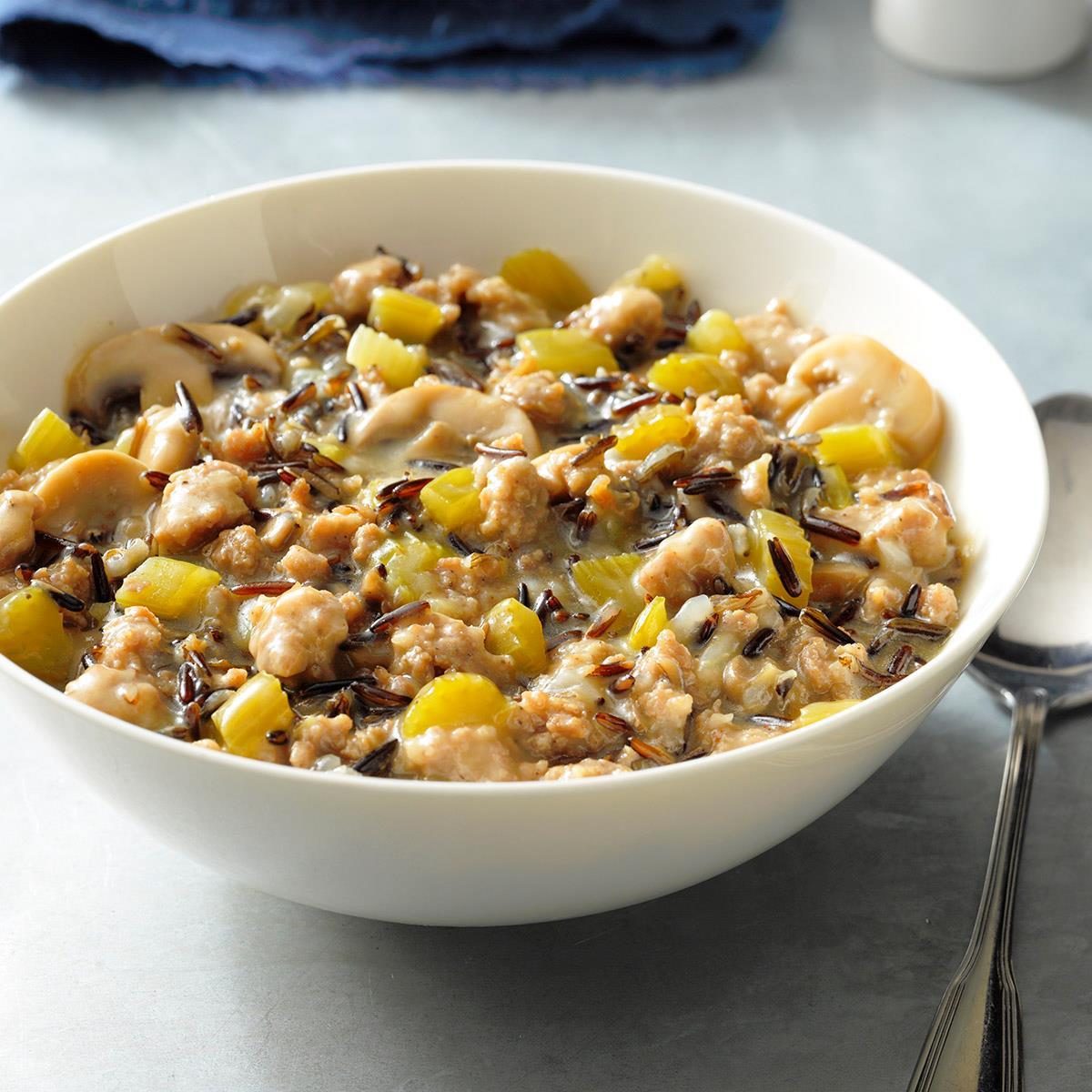
Slow-Cooked Wild Rice
This recipe has become such a family heirloom that I asked my mother's permission before passing it along. It has traveled to weddings, baptisms, landmark birthdays and wedding anniversaries—and it always makes people happy. —Janet Mahowald, Rice Lake, Wisconsin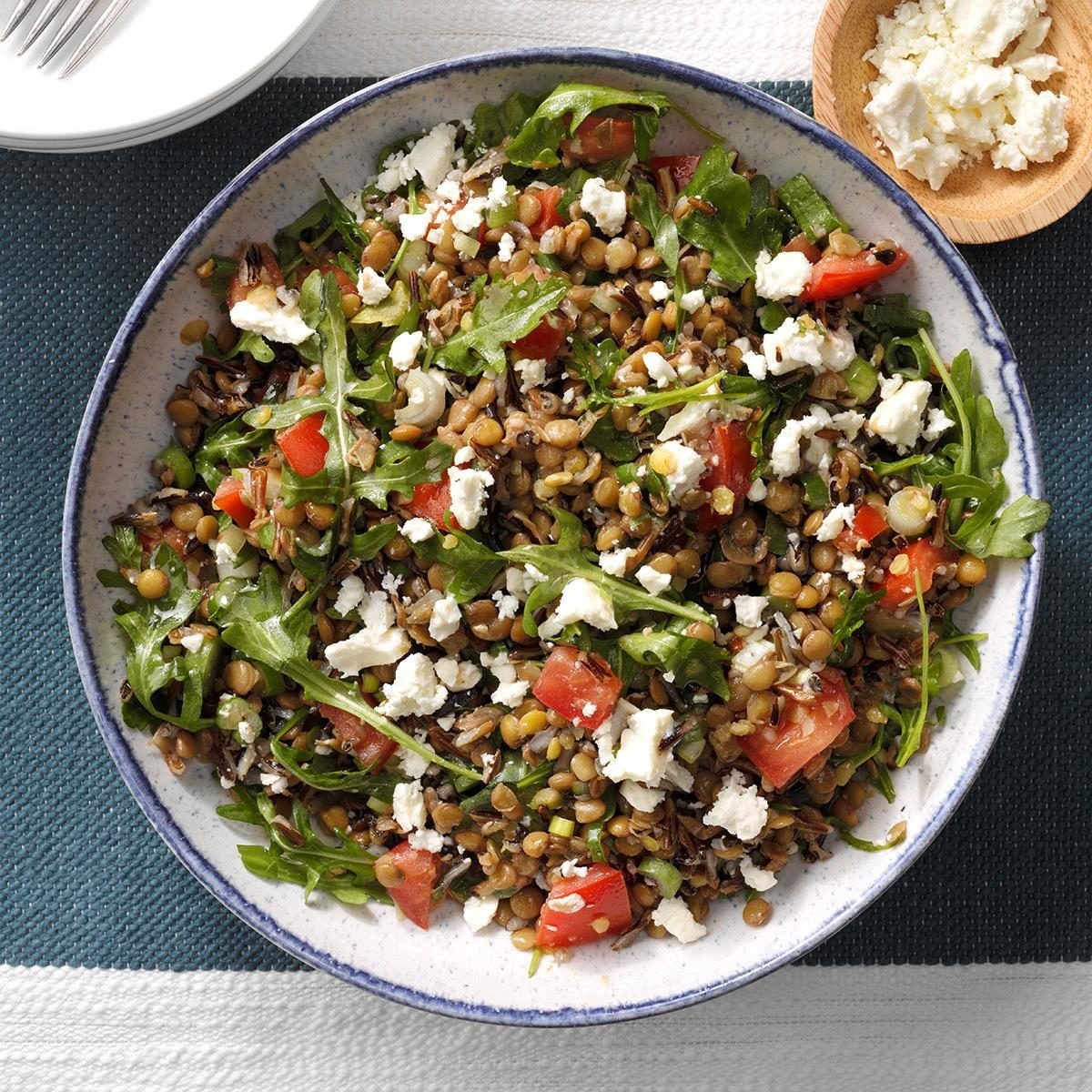
Wild Rice and Lentil Salad
This healthy, protein-packed salad is a perfect main dish for the vegetarians who grace your holiday table—or as a side in smaller portions. My family loves it for the flavors, and my friends love it because I offer them a healthy alternative to meat. —Mary Leverette, Columbia, South Carolina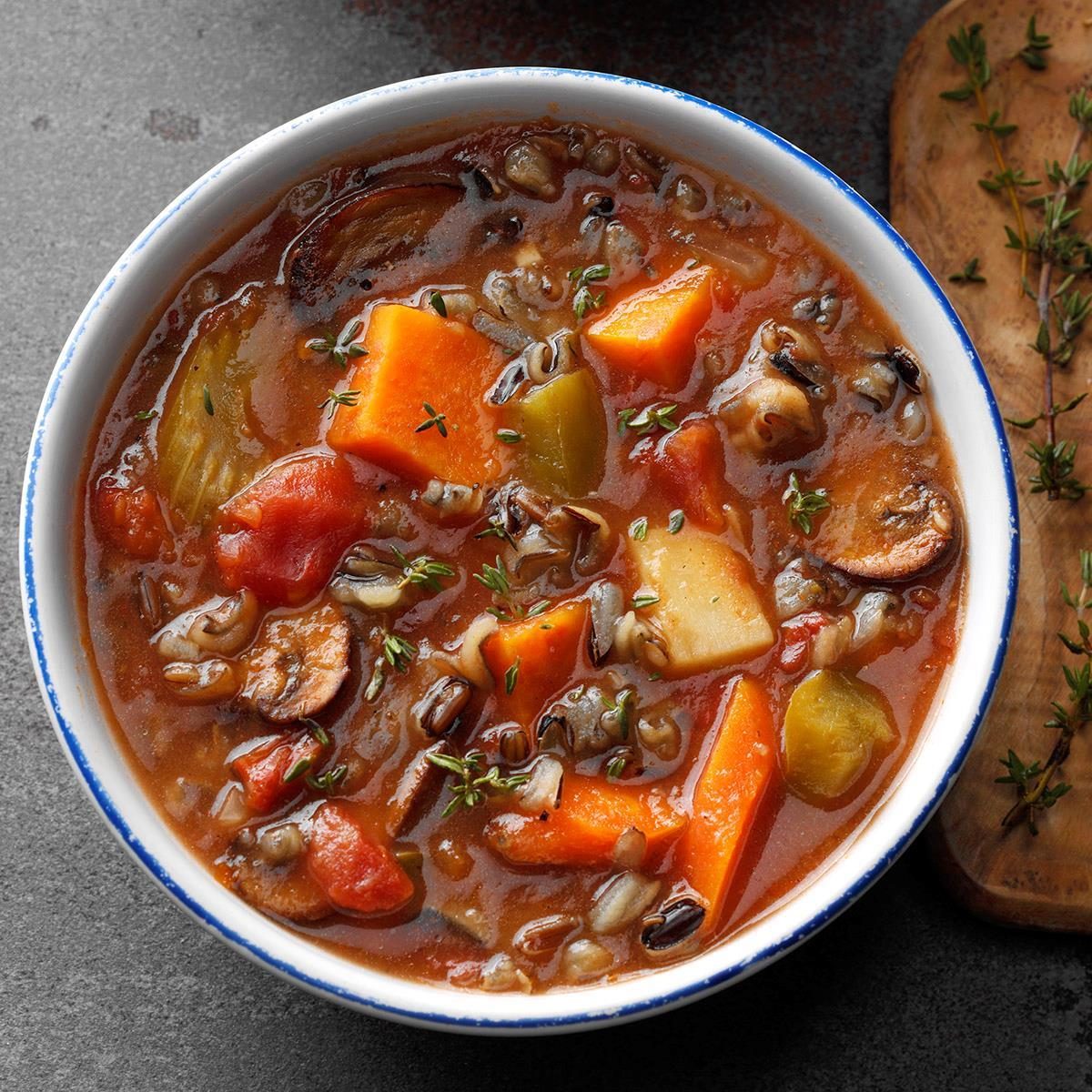
Slow-Cooked Vegetable Wild Rice Soup
This thick and hearty soup is packed with colorful vegetables. —Thomas Faglon, Somerset, New JerseyThe post How to Cook Wild Rice appeared first on Taste of Home.
source https://www.tasteofhome.com/article/how-to-cook-wild-rice/



0 Response to "How to Cook Wild Rice"
Post a Comment